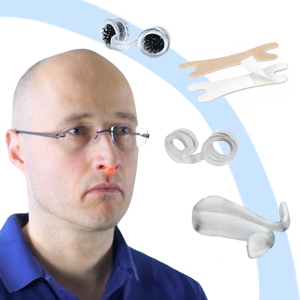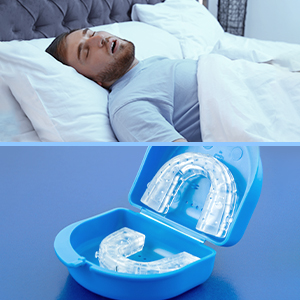As if there weren’t enough problems during pregnancy – with water retention, mood swings, hot flushes – there is also an increased risk of snoring in pregnancy. About a quarter of pregnant women suffer from snoring during pregnancy, from the sixth month of pregnancy, onwards. We have compiled some helpful tips for you so that association of “pregnancy and snoring” do not become a problematic combination. In addition, we explain the causes of snoring in pregnancy and give women suggestions on how to get snoring during pregnancy under control – for example by using a nasal dilator for gestational colds.
Reasons for snoring in pregnancy
Not only does your baby bump grow
Ultimately, the reason for snoring during pregnancy is the weight gain. Not only does your baby bump expand, but so to does the neck. What really happens is that fatty deposits in the pharynx (throat) increase, causing the airways become narrower as a result. As a result the air you breathe can no longer pass through unhindered and it causes the flabby tissues in your throat to vibrate. This results in snoring. The best anti snoring advice is to stop lying on your back. There is a wide range of positional therapy products that can prevent you from sleeping in a supine position. They do not only maintain your airways, but also ensure a better blood flow to the unborn baby.
Gestational colds
Also the frequent “gestational cold” (or pregnancy rhinitis) can promote the development of snoring in pregnancy. Nasal dilators can help free the airways and prevent snoring.
About 30% of pregnant women are affected by a chronic cold. The reason for this is that the levels of the sex, hormones estrogen and progesterone, rise increasingly during pregnancy. They don’t just have an effect on the libido, but also on the nose. They cause mucous membranes in the nose to swell, as a result nasal breathing is impeded and leads to snoring during pregnancy.

Consequences of snoring during pregnancy
High blood pressure
High blood pressure can generally become a problem during pregnancy. The baby is supplied by the mother’s blood, more blood is produced overall during pregnancy and blood pressure consequently rises. Snoring can increase the pressure even further. In the worst case, pre-eclampsia could develop.
High blood pressure also causes kidney problems and water retention. In addition, it could cause placental abruption (where the placenta separates from the uterus too early), this can trigger a wide range of potentially dangerous and unwanted complications, including premature childbirth. In a study conducted by interviewing 502 women, Dr. Jennifer Santiago at the Presbyterian Hospital in New York, Department of Obstetrics and Gynecology, found that snoring in pregnancy increases a woman’s risk of preeclampsia two-fold when compared to woman who didn’t snore during pregnancy .
Obstructive sleep apnea syndrome (OSAS)
In most cases, snoring disappears shortly after childbirth. However, if your snoring during pregnancy becomes more severe, it is advisable to consult a doctor. There is a risk that the snoring is not completely innocuous and that it may be a result of sleep apnea syndrome, this can have serious consequences for the unborn child. The risk is particularly high if the expectant mother was already overweight before birth or she develops diabetes (gestational diabetes) during the pregnancy.
In obstructive sleep apnea syndrome (OSAS), the airways are partially or completely blocked during sleep for short periods (up to 30 seconds). As a result, breathing also stops. Only when the pregnant woman is startled and gasps for air due to a spontaneous wake-up reaction, a so-called “arousal”, does breathing resume and the situation normalises. The problem with an increased number of ”pauses” in breathing is that the oxygen concentration in the mother’s blood drops. Since the unborn child is also supplied by the mother’s blood via the placenta , it also experiences the effects of the possible oxygen deficiency, even more seriously than the expectant mother. The lack of oxygen can cause delays in the growth of the foetus. Due to these possible problems, pregnant women who suspect they have OSAS should seek medical advice immediately.
Upper Airways Resistance Syndrome (UARS)
Even if, despite the great resistance, breathing is still possible it can be an indication of Upper Airways Resistance Syndrome (UARS). The permanently increased effort required to breathe, and the risk of a non-optimal oxygen supply to which the pregnant woman is exposed in UARS can also increase the risk of preeclampsia. A visit to the doctor is therefore recommended.
Our tips: Snoring during pregnancy – what to do?
- Best sleeping position
If you are snoring during pregnancy, sleep on your left side and avoid sleeping on your back. This promotes blood flow to the foetus and it also prevents the expectant mother’s tongue from sliding back into the pharynx (throat), thus obstructing the airways and leading to tongue-based snoring.
- Positional therapy
What helps to prevent snoring in pregnancy? Among other things, positional therapy. Positional therapy includes snoring aids such as backpacks, vests or pillows that make sleeping on your back impossible. Before you use such a product, e.g. an anti snore pillow, to prevent you from sleeping in the supine position, please make sure that the straps do not restrict the foetus’s range of motion (check with your gynaecologist if necessary).
- Nasal dilator
If you suffer from gestational colds, a nasal dilator can help you. Nasal dilators promote nasal breathing and thus ensure peaceful nights.
- Room temperature
Ensure that the room temperature of your bedroom is not too high, this also reduces the tendency of the mucous membranes in the nose to swell.
- Snoring test
Take the SomniShop snoring test to check if your snoring is not exclusively pregnancy related. Find out what type of snoring you suffer from.
- Blood pressure
Have a doctor examine you, especially your blood pressure.
Nasal dilator purchasing advisor
What must you take into consideration when making a purchase? See all our nasal dilators presented here.
Positional therapy purchasing guide
Helps you make an informed buying decision when buying a positional therapy device, such as an anti-snoring vest or anti-snoring backpack.
Mandibular advancement device (MAD) purchasing guide
Advises you what you should pay attention to when buying a mandibular advancement device (MAD). We present different models and technical approaches here.
Mandibular advancement device guide – answers based on practical experience
Mandibular advancement devices can help with sleep apnoea in a lot of cases. They are now also provided by the NHS. Find out how exactly they can help, and when they are provided by the NHS.

Medical Doctor, Berlin
Jan Wrede works as a medical doctor in Berlin. He studied medicine at FAU University in Erlangen-Nuremberg and Semmelweis University in Budapest. He had already written numerous scientific articles during his studies, especially on the subject of snoring.









 Welcome to SomniShop
Welcome to SomniShop